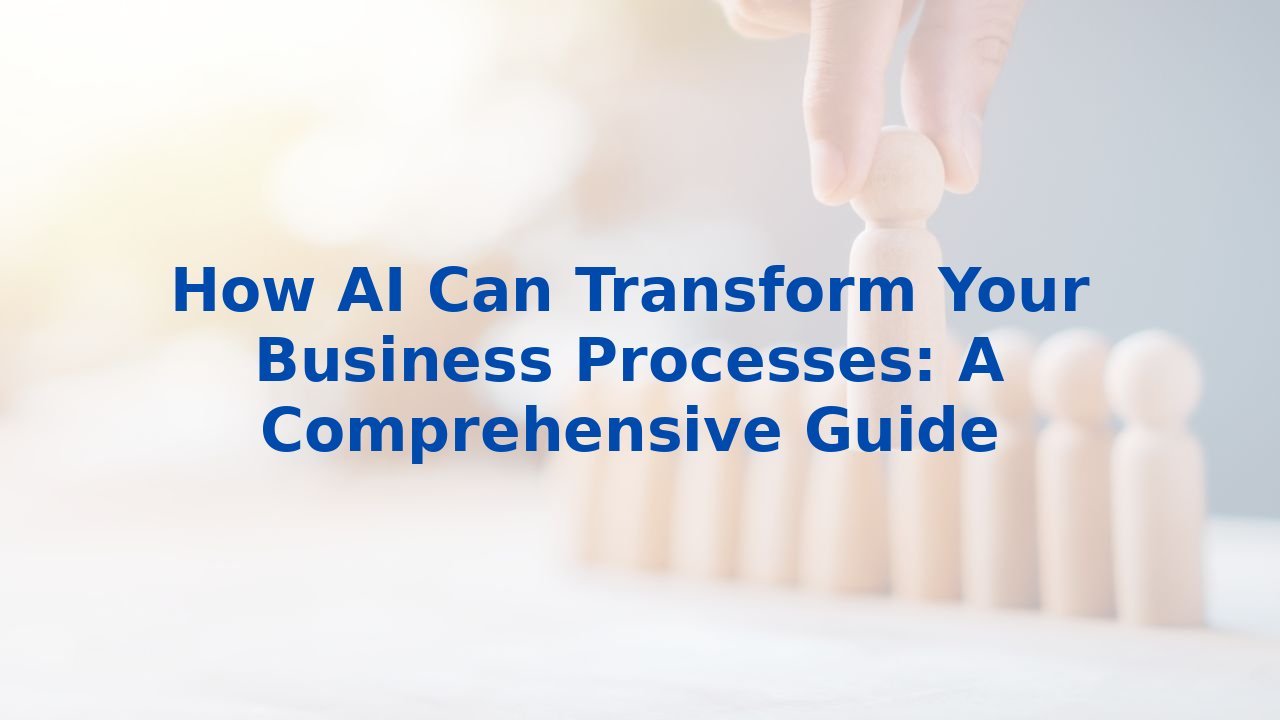How AI Can Transform Your Business Processes: A Comprehensive Guide
How AI Can Transform Your Business Processes: A Comprehensive Guide
Introduction
In an era where staying competitive is synonymous with efficiency and productivity, businesses are navigating the challenges of rapid change and innovation. Enter artificial intelligence (AI) — a powerful catalyst for transforming everyday business operations. As organizations strive to stay ahead, understanding how AI can weave seamlessly into their business processes becomes essential. This guide explores the various facets of business processes that AI can elevate, showcasing the profound benefits of integrating AI into your operational fabric.
Understanding Business Processes
At its core, a business process is a collection of structured activities or tasks, designed to produce a specific service or product. These may include production workflows, marketing campaigns, customer service interactions, and financial management. With numerous interconnected steps and stakeholders involved, traditional approaches often fall prey to inefficiencies and inaccuracies due to manual handling, human oversight, and infrequent reviews.
How AI Enhances Business Processes
AI’s transformative potential lies in its ability to automate mundane tasks, analyze vast amounts of data, and deliver actionable insights. Below, we explore several impactful ways AI can enhance business processes:
1. Process Optimization
Imagine having the ability to visualize and optimize your processes based on historical data. AI empowers businesses to identify patterns, inefficiencies, and key performance indicators (KPIs) through simulation models. By predicting costs and lead times, companies can strategically alter processes to alleviate bottlenecks and enhance productivity.
2. Process Mining
By marrying data analysis and visualization, AI simplifies the complexity of process management through process mining. This technique allows organizations to automatically gather insights from various source systems—be it CRM, ERP, or other databases. By spotting deviations and anomalies, process mining becomes a proactive tool that fosters continuous improvement and efficiency.
3. Automation
Why should teams be bogged down with repetitive tasks? AI wipes away low-value work such as data entry, invoice processing, and routine scheduling. By automating these responsibilities, employees can focus on what truly matters: strategic, value-added initiatives that drive business growth.
4. Real-Time Monitoring
In the quest for agility, AI excels in real-time monitoring of business processes. With up-to-the-minute insights on process health, organizations can nip potential problems in the bud while also seizing emerging opportunities. This level of visibility ensures faster responses and significantly enhances operational efficiency.
5. Decision Support
When it comes to complex decision-making, AI stands as a formidable ally. By processing both structured and unstructured data from diverse sources, AI extracts valuable insights that illuminate the decision-making landscape. With predictive analytics and scenario simulations, decision-makers can navigate risks and make informed choices.
Benefits of AI in Business Processes
The integration of AI into business processes affirms a plethora of benefits:
- Improved Efficiency: By automating tasks, AI accelerates workflows while minimizing human errors.
- Enhanced Decision-Making: AI-driven insights foster better, data-informed decisions.
- Increased Productivity: Freing employees from monotonous tasks enables them to dedicate their energies to strategic initiatives.
- Reduced Costs: AI insights optimize resource allocation, thereby cutting operational costs.
- Better Risk Management: Swift analysis of historical data empowers proactive risk assessments and responses.
Training Employees for AI
For AI to catalyze real transformation, it necessitates a workforce equipped with the knowledge and skills to harness its potential effectively. Investing in employee training reaps significant rewards:
- Improved Collaboration: A well-trained workforce operates seamlessly with AI systems, optimizing performance.
- Enhanced Problem-Solving Skills: Understanding AI fosters critical thinking, empowering employees to navigate complex issues adeptly.
- Adaptability: Familiarity with AI tools and strategies enables quicker adjustments to an ever-evolving business landscape.
Conclusion
As we embrace the digital age, AI emerges as a transformative force reshaping business processes across all industries. Through automation, data analysis, and improved decision-making, businesses can vastly improve efficiency and reduce costs, all while preparing their workforce to work hand-in-hand with AI advancements. With the right training and mindset, organizations can harness AI's full potential—ensuring they not only survive but thrive in a competitive marketplace. For more insights on AI training and certification for your organization, consider exploring complete AI training solutions that equip your entire workforce to unlock new possibilities.



